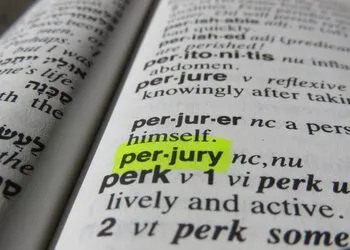
Anyone who has seenLaw & Orderor any similar courtroom drama is familiar with the prosecution (in reality usually the court clerk) asking a witness if they swear to tell “the truth, the whole truth, and nothing but the truth.”
While courtroom dramas are generally inaccurate depictions of the court system, ourMassachusetts criminal defense attorneyexplains, this particular aspect of the proceedings is a fairly accurate representation of the duty of defendants and witnesses to tell the truth when under oath.
Perjury is generally defined as knowingly and intentionally lying about a material issue while on the stand under oath in court. Perjury is accompanied by serious criminal penalties.While perjury is usually dealt with as a separatecriminal chargeagainst the untruthful witness, the “perjury defense” is when a party in the existing case uses the fact that the witness was lying under oath to have their testimony stricken from the record or to allow the factfinder toconsider evidenceof the lie when evaluating the weight to be given to the witness’s testimony.
You may have seen the concept of perjury in the news recently in relation to the defamation case against media personality Alex Jones. Jones was confronted by the attorney for the opposing party—parents of a child who was killed in a schoolshootingwho allege that Jones defamed them by claiming that they were paid actors and staged their child’s death—who asserted that Jones had lied under oath about his knowledge of certain evidence. In this case, the opposing party had proof that Jones had lied due toinadvertent disclosureof the evidence in question by Jones’s attorney.
While this was a civil case, the same principle applies in criminal cases as well: when a party has proof that a witness has lied on thestand under oath, the party can move to have the perjured testimonyremoved from the recordvia a motion to strike (or alternatively, such evidence that the witness is lying can be taken into account by the judge or jury when weighing the witness’s credibility).
It is important to note that in this sense, the perjury “defense” is not like other typical affirmative defenses in a criminal case (insanity,intoxication, duress, etc.) in that it is not something that ultimately allows a defendant toavoid a conviction, but it is an effective tool in the context of a motion to strike to limit damaging testimony against a defendant when there is proof that such testimony was willfully and intentionally untruthful.
B. Defenses to a Perjury Charge
Massachusetts law explicitly allows for a defense to a perjury charge where the witness believed his false statement was true at the time that he made it, or that the falsity of the statement was the result of the witness’s good faith mistake or error.Trauma about the incident that resulted in the loss of memory or mistaken belief about the facts may also be a defense to perjury.
Finally, if the defendant was forced to make the false statement under duress or based upon credible threats of harm if the defendant told the truth, then the defendant may defend the charge on the grounds that he or she did not “willfully” make the false statement.
Additionally, under limited circumstances, if the defendant admits that his statement was false, that admission may save him from being prosecuted under the statute. However, because a number of factors will be considered before the defendant’s admission will save him from prosecution, a defendant should consult with a lawyer before making any admissions of false statements.
* * *
Whether you need to try to remove perjured testimony from the record via a motion to strike or whether you are seeking to assert an affirmative defense to a perjury charge, it is important to have a competent criminal defense attorney in your corner who understands the relevant law in these complicated areas. Contact experienced criminal defense attorney Nate Amendola today for any legal issues related to perjury.
For a free legal consultation, call (781) 740-0800
Schedule a Free Consultation with a Massachusetts Criminal Defense Attorney Today
If you’ve been arrested on an OUI/DUI charge, domestic violence, disorderly conduct, or drug possession, you should speak to an experienced defense attorney as soon as possible. You cancontact us onlineor call our office directly at(781) 740-0800to schedule your free consultation with one of our top-notch defense lawyers. We have been proudly servicing clients throughoutNorwell, Massachusetts, and surrounding areas such as Plymouth, Barnstable, Nantucket, and more.
Call or text (781) 740-0800 or complete a Free Case Evaluation form


